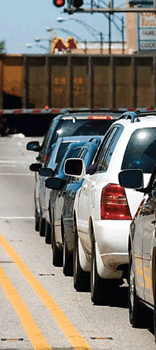
It’s no secret traffic congestion in Chicagoland is bad and getting worse. Despite recent attention to climbing gas prices, most people still do not fully comprehend how much gridlock is costing them — and our region.
To compete globally, metropolitan Chicago needs a comprehensive understanding of the waste and implications of excess congestion. With this information, the entire region can begin to identify transportation strategies and investments that will strengthen our communities.
To quantify the true cost of congestion in northeastern Illinois and demonstrate its magnitude, the Metropolitan Planning Council commissioned HDR Decision Economics to study excess traffic on Chicagoland’s expressways and arterial roads. This report details the findings, showing the burdensome effects of congestion on three scales — global, regional and individual.
Return to the main page of Moving at the Speed of Congestion.